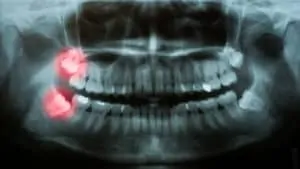Uncategorized
Gum recession is a common dental concern that occurs when the gum tissue that surrounds the teeth wears away or pulls back, exposing the tooth’s root. This can lead to sensitivity, discomfort, and an increased risk of other dental issues. The good news is that there are things you can do to help avoid or reduce the risk of gum recession.
- Good Oral Hygiene
The foundation of healthy gums and teeth is proper oral hygiene. Regularly brushing and flossing not only help keep breath fresh and teeth clean, it can also help prevent gum recession. We recommend using a soft-bristle toothbrush to gently clean your teeth and gumline at least twice a day. You should also floss daily to remove food particles and plaque from between your teeth, where your toothbrush may not reach effectively.
- Brush Gently
Believe it or not, the way you brush your teeth matters just as much as how often you do it. Brushing with excessive force or using a hard-bristle toothbrush can wear away gum tissue and enamel, potentially leading to gum recession and other oral health problems. When brushing, take your soft-bristle toothbrush and use gentle, circular motions to clean your teeth. Hold the toothbrush at a 45-degree angle to your gums to effectively remove plaque without causing unnecessary friction.
- Regular Dental Visits
Regular visits to your dentist in Sparks for professional cleanings and check-ups are vital for addressing gum recession. Dental professionals can identify early signs of gum disease and recession, providing timely interventions to prevent progression. During a dental cleaning, your dentist or dental hygienist will remove plaque and tartar buildup from your teeth and gums, reducing the risk of gum inflammation and recession. In more advanced cases, dental treatments such as scaling and root planing may be recommended to deep clean below the gumline and promote gum tissue reattachment.
- Healthy Lifestyle Choices
Your overall health is closely linked to your oral health. Habits like smoking, excessive alcohol consumption, and poor nutrition can contribute to gum recession and other dental issues. Smoking, in particular, restricts blood flow to the gums, impairing their ability to heal and regenerate.
Gum Tissue Regeneration Procedures
In more severe cases of gum recession, your dentist in Sparks might recommend surgical procedures to reverse the condition. Gum grafting is a common technique that involves taking gum tissue from one area of your mouth and attaching it to the recessed areas. This not only covers the exposed roots but also stimulates new tissue growth. Alternatively, newer advancements in dentistry involve the use of growth factors and proteins that encourage natural tissue regeneration and attachment. Your dentist will determine the most suitable approach based on the extent of your gum recession and overall oral health.
Gum recession may be reversible, especially when addressed early. By maintaining excellent oral hygiene practices, using gentle brushing techniques, seeking professional dental care, making healthy lifestyle choices, and considering surgical interventions when necessary, you can effectively care for your gums. Remember, prevention is key, so be proactive in caring for your gums to enjoy a beautiful smile and optimal oral well-being for years to come. If you’re experiencing gum recession, consult your dentist in Sparks for personalized guidance and treatment options.
If you’re pregnant, especially if it’s your first time, dental care may be the farthest thing from your mind. But there are good reasons to still keep your oral health top of mind during this joyous time. In fact, your dentist in Sparks recommends that everyone, including those who are pregnant, continue to keep up with regular preventive dental care every six months. After all, the truth is, that the oral health of the mom can affect the overall health of the baby.
Pregnancy Gingivitis
During pregnancy, hormones can go haywire thanks to the rise and fall of estrogen and progesterone. As a result, gum disease, or what’s known as pregnancy gingivitis, is common and affects about half of pregnant women, according to the American Dental Association. The symptoms of this condition are pain, swelling, tenderness, and excessive bleeding in the gums. While this may seem like no big deal, pregnancy gingivitis can result in low-birth-weight babies and even preterm births. If you have signs of pregnancy gingivitis, schedule an appointment with your dentist in Sparks.
Decay & Cavities
Pregnancy cravings are real and, depending on the craving, can affect oral health and increase the risk of decay. For example, if your pregnancy cravings are treats that are high in sugar or you find yourself snacking more often than usual, it can increase the likelihood of developing a cavity. Additionally, morning sickness, which affects an estimated 70% of pregnant women, can weaken tooth enamel. When teeth are exposed to stomach acid over an extended period of time, this acid can wear away the protective layer of enamel and increase the risk of decay.
The good news is that there are things you can do to limit the negative effects of stomach acid on teeth:
- Rinse with water – Swish water around in your mouth and spit it in the sink after you experience morning sickness. This can remove some of the acids from your teeth.
- Wait an hour – You may feel like brushing your teeth immediately after getting sick, but your dentist in Sparks recommends that you wait at least an hour before brushing after you’re sick.
- Drink water – Water can neutralize and wash away acids and bacteria.
- Use a tongue scraper – After you get sick, gently use a tongue scraper across your tongue. This can help remove some of the acids that may stick around on the tongue and then transfer to the teeth.
The Oral & Overall Health Connection
Oral health is closely related to overall health as well as pregnancy health. This is why three of the most respected organizations – the American Dental Association, the American Congress of Obstetricians and Gynecologists, and the American Academy of Pediatrics – encourage every expectant mother to see the dentist, especially during the earlier stages of pregnancy. It’s an important part of ensuring good health for the mom and the baby.
If you’re pregnant, you shouldn’t put off regular dental visits to your Sparks dentist throughout your pregnancy. It’s also crucial to keep brushing twice a day and flossing once a day to keep bacteria at bay. However, if you need non-emergency or non-routine dental care such as cosmetic dentistry or a dental implant, wait until your baby is born to proceed with those treatments.

Wisdom teeth are usually first seen on dental x-rays during routine appointments with your dentist in Sparks. Typically your dental team can see them before you even know that they’re starting to work their way to surface. This is also when we can most likely tell if they’re going to need to be removed. Most of the time, they will need to come out. In fact, 90% of Americans have their wisdom teeth removed. But what happens if you don’t have your wisdom teeth extracted?
Overcrowding
The top reason why most wisdom teeth need to be removed is that there’s simply not enough room in the mouth for these new teeth. Your dental x-rays will show your dentist whether or not there will be enough space for your wisdom teeth. However, if your mouth doesn’t have adequate room and you do not have your wisdom teeth removed, it can lead to overcrowding, crooked teeth, or even an impaction. Having impacted wisdom teeth essentially means that the teeth are stuck in your bone below the gum line. This can be very painful and increases the risk of infection.
Coming in Sideways
Wisdom teeth also have a funny way of working themselves sideways and start to come through horizontally rather than vertically through the gums. If this occurs, nearby healthy teeth can be seriously damaged and your bite can be affected, causing larger, more serious, and painful problems.
The Dangers of Bacteria
Let’s say your wisdom teeth develop perfectly and there’s room for them in your mouth. While rare, it does happen. If you’re one of the few that can keep their wisdom teeth, problems may still find you in the future. Wisdom teeth are way in the back of the mouth which makes them very difficult to properly care for. If proper oral hygiene isn’t maintained, teeth can decay and the risk for gum disease increases.
Maintaining regular visits to our Sparks dental office not only helps protect your existing teeth from decay, but these appointments can also help us identify whether your wisdom teeth should be removed before any problems arise. If your wisdom teeth do need to be removed, don’t worry. The procedure is incredibly common and your dental team will do everything they can to keep you comfortable during and after treatment.
Sparks’ Total Health Approach to Dental Care
When your oral health is a priority, the only thing it can do is benefit you. Not only will you see an improved smile, better functionality of your teeth, and little to no discomfort, but you can also be improving other areas of your health as well.
What is the Oral-Systemic Connection?
Dentistry and medicine are closely linked as the oral-systemic connection becomes more clearly understood. Dentists trained in diagnosing periodontal disease can spot changes within the mouth, that could potentially be a sign of a larger issue. The oral-systemic connection demonstrates the association between your oral health and different systemic diseases, such as heart disease, diabetes, and stroke.
What Can I Do To Ensure My Oral Health?
First, you need to visit your dentist regularly. This way, she can monitor your oral health and intervene if needed, before issues become more complicated.
Taking a proactive approach to your dental care is another great way to ensure longevity of your oral health. Practice meticulous oral hygiene at home, including proper brushing and flossing, and watch for signs of periodontal disease, such as bleeding, swollen, or receding gums.
The best investment in your health is to stay healthy and for many patients, it starts with good oral health.

